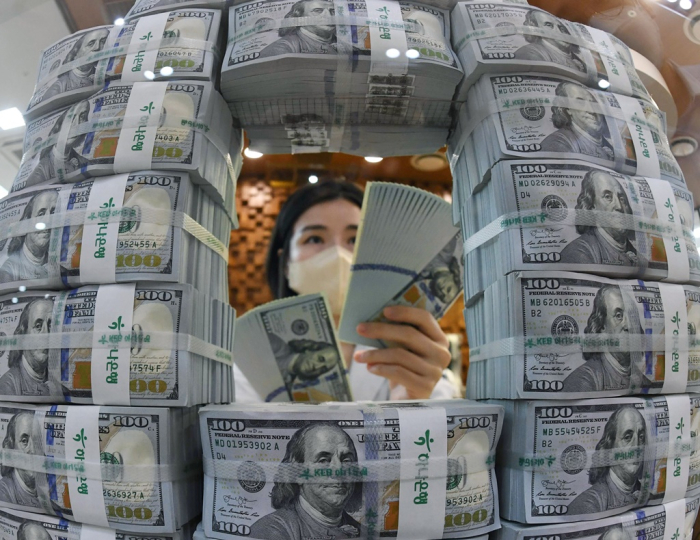Foreign exchange
Tumbling won adds to Bank of Korea rate hike views
Won at an 11-month low, likely to boost import prices and lead consumer inflation
By Aug 17, 2021 (Gmt+09:00)
1
Min read
Most Read
Samsung shifts to emergency mode with 6-day work week for executives


Alibaba eyes 1st investment in Korean e-commerce platform


Blackstone signs over $1 bn deal with MBK for 1st exit in Korea


NPS loses $1.2 bn in local stocks in Q1 on weak battery shares


MBK eyes stake in Korean software developer Tmaxsoft



The South Korean won skidded to an eleven month-low as foreign investors extended a selling spree in the local stock markets, adding to expectations of a central bank interest rate hike later this year.
The won closed the domestic trade down 0.6% at 1,176.3 against the dollar on Aug. 17, the weakest since Sept. 15, 2020. The South Korean unit lost 3.1% in the last one month, almost a half of a decline of 7.6% so far this year.
Foreign investors sold a net 486.9 billion won ($414.5 million) in South Korean stocks, expanding their selling spree to a sixth straight session, according to the Korea Exchange data. During the period, they dumped a net 7.6 trillion won in total, far more than a 4.9 trillion won sale in the entire July.
ŌĆ£The won could weaken to 1,200 if foreign stock selling continues,ŌĆØ said HI Investment & SecuritiesŌĆÖ chief economist Park Sang-hyun.
The South Korean currency has already been under pressure against the dollar from expectations that the Federal Reserve is likely to scale back its massive asset purchase program as US nonfarm payrolls rose by 943,000 in July, suggesting a strong labor market.
Turmoil in Afghanistan also boosted geopolitical risks and preference on safer assets including the dollar.
The weaker won was expected to further ramp up South KoreaŌĆÖs import prices, which are already on upward pressure due to rising prices of commodities including crude oil. Import prices in July rose 19.2% from a year earlier, the highest growth since December 2008, according to the Bank of Korea (BOK) data.
Higher import prices are likely to translate into higher consumer inflation. The countryŌĆÖs consumer inflation has been higher than 2% since April, adding to prediction that the annual inflation will run above the central bankŌĆÖs target of 2%, for the first time since 2012.
The BOK is more likely to become the first Asian central bank to raise interest rates to stem inflation and stabilize the won.
BOK Governor Lee Ju-yeol already said on July 15 that the central bank may consider a monetary policy adjustment from the policy meeting later this month.
Write to Ik-Hwan Kim at lovepen@hankyung.com
Jongwoo Cheon edited this article.
More to Read
-
 Banking & FinanceBank of Korea sets stage for tightening after holding rates
Banking & FinanceBank of Korea sets stage for tightening after holding ratesJul 15, 2021 (Gmt+09:00)
3 Min read -
 Central bankBank of Korea governor sends stronger signal to raise rates this year
Central bankBank of Korea governor sends stronger signal to raise rates this yearJun 11, 2021 (Gmt+09:00)
3 Min read -
 Central bankBank of Korea governor flags rate hike as economy improves
Central bankBank of Korea governor flags rate hike as economy improvesMay 27, 2021 (Gmt+09:00)
2 Min read
Comment 0
LOG IN


